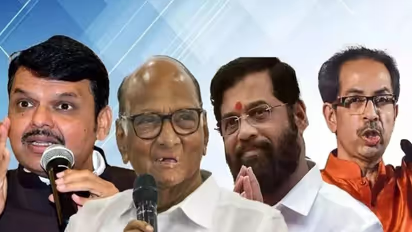ECI clears Congress' misconceptions on voter turnout and electoral roll in Maharashtra Elections 2024

Synopsis
The ECI on Tuesday issued a detailed clarification to address the concerns raised by the Congress regarding voter turnout and electoral roll discrepancies in the recently concluded Maharashtra Assembly Elections 2024.
The Election Commission of India (ECI) on Tuesday issued a detailed clarification to address the concerns raised by the Indian National Congress (INC) regarding voter turnout and electoral roll discrepancies in the recently concluded Maharashtra Assembly Elections 2024. In its comprehensive response, the ECI reiterated the transparency, accuracy, and rule-based process that governs the preparation of electoral rolls and the reporting of voter turnout data.
The Mahayuti, comprising the BJP, Shiv Sena and Nationalist Congress Party, secured a landslide victory in the November 20 assembly polls by winning 230 out of 288 seats.
Clarification on Voter Turnout
The ECI categorically refuted the Congress' claims about discrepancies in voter turnout, explaining that comparing voter turnout data at 5 PM with the final polling data is misleading. The Commission explained that an increase in voter turnout from 5 PM to the final count at 11:45 PM is a natural part of the aggregation process, as polling data is gradually compiled from each polling station. The final voter turnout figures are drawn from the statutory Form 17C, which contains the official record of votes cast at each polling station and is made available to authorized agents of candidates at the time the polls close.
The ECI emphasized that voter turnout data cannot be manipulated after the polling booths close, as Form 17C serves as the immutable source of information. This system ensures the accuracy and transparency of voter turnout reporting.
Addressing Congress' Allegations of Electoral Roll Irregularities
The Congress had raised concerns about the addition of 50,000 electors in 50 constituencies between July and November 2024, of which 47 were reportedly won by the Mahayuti alliance. The ECI dismissed these allegations as "factually incorrect and misleading." The Commission clarified that only 6 constituencies saw an addition of over 50,000 electors during the stated period. The notion that this number could explain the results in 47 constituencies was debunked, as the actual data does not support this claim.
The ECI provided detailed insights into the meticulous process behind electoral roll preparation and the participation of political parties in every step. The Commission assured that all changes to the electoral roll, whether additions or deletions, are made strictly according to rules, with full involvement of political parties at each stage. The ECI pointed out that deletions were made based on valid reasons, such as the death, relocation, or duplication of voter entries, and confirmed that the Congress had been involved in this process.
Transparency and Stakeholder Involvement
The ECI reiterated that its approach to electoral roll updation is transparent and participative. The process is designed to involve political parties, candidates, and the public, with numerous checks and balances in place to ensure fairness. The Commission also highlighted nearly 60 instances where political parties were actively involved in the electoral process, from the preparation of the electoral rolls to the polling day.
The ECI further assured that all data related to electors in Maharashtra, including Form 20, is available for public access on the Chief Electoral Officer's website and can be downloaded by any stakeholder.
No Irregularities in Deletions
In response to Congress' concerns about bulk deletions in the electoral rolls, the ECI clarified that there were no irregular patterns or unusual deletions in Maharashtra. On average, 2,779 electors per constituency were deleted, with the reasons being deaths, relocations, and duplicate entries. The process followed due procedure, with the participation of Congress representatives, to ensure fairness and compliance with electoral rules.
The Election Commission concluded its response by emphasizing its commitment to collaboration with political parties, welcoming constructive suggestions to further enhance the transparency and integrity of the electoral process. The Commission reaffirmed its dedication to upholding the democratic values of fairness, transparency, and accountability in all aspects of elections.
Stay updated with the Breaking News Today and Latest News from across India and around the world. Get real-time updates, in-depth analysis, and comprehensive coverage of India News, World News, Indian Defence News, Kerala News, and Karnataka News. From politics to current affairs, follow every major story as it unfolds. Get real-time updates from IMD on major cities weather forecasts, including Rain alerts, Cyclone warnings, and temperature trends. Download the Asianet News Official App from the Android Play Store and iPhone App Store for accurate and timely news updates anytime, anywhere.